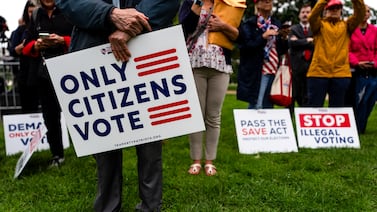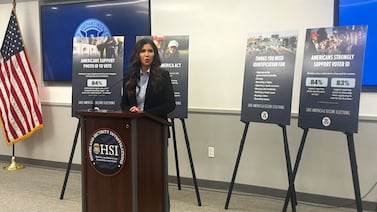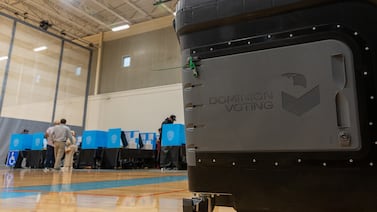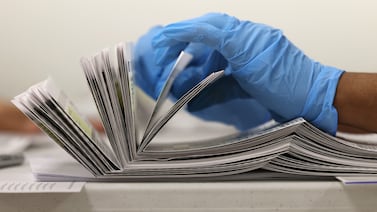Votebeat is a nonprofit news organization reporting on voting access and election administration across the U.S. Sign up for our free weekly newsletter to get the latest.
The U.S. Justice Department sought Tuesday to pull out of an ongoing voting rights case against Virginia over the state’s removal of names from voter rolls shortly before the November election.
The department’s motion for dismissal, filed in U.S. District Court for the Eastern District of Virginia, doesn’t end the case, because there are also private plaintiffs, including voting rights groups, challenging Virginia’s action.
The motion came soon after the Justice Department, now under the Trump administration, reversed the Biden administration’s position in a case involving Louisiana’s congressional maps, and amid a reported reconsideration of the department’s approach to civil rights cases. Some voting rights watchdogs fear that the department’s priorities will shift under the new leadership.
The department did not immediately respond to a request for comment on the filing.
Danielle Lang, senior director of voting rights at the Campaign Legal Center, represents the other organizations bringing the lawsuit, including the League of Women Voters of Virginia. She said the department’s withdrawal means that ongoing disputes over whether those organizations have legal standing to sue are now more critical, because private plaintiffs face a higher burden than the federal government in establishing their right to sue.
So far, Lang said, courts have found that her clients do have standing to bring the case.
Lang said she believes the withdrawal signaled a shift in the department’s enforcement priorities on voting rights.
The case arose after Virginia Gov. Glenn Youngkin, a Republican, issued an executive order in August requiring daily updates to voter lists to remove ineligible voters.
The Justice Department and other organizations separately sued Virginia in October, saying the order violated a provision of the National Voter Registration Act, which includes a ban on systematic cleaning of voter rolls within 90 days of a federal election.
The state argued that it was removing registered voters who disclosed on their own to the Department of Motor Vehicles that they were not citizens, but the U.S. solicitor general said in a U.S. Supreme Court brief that the state matched voters with potential noncitizens identified by the DMV “based on as little as a shared first and last name” and that the people removed included citizens.
In October, the Supreme Court ruled Virginia could remove roughly 1,600 voters it believed to be noncitizens from the rolls, even though it was within 90 days before the election. The justices did not explain their legal reasoning, beyond noting that three justices would have denied the state’s request.
The case is still pending before the district court.
David Becker, head of the nonprofit Center for Election Innovation and Research and a former Justice Department attorney, said it is possible the department concluded that the Virginia case isn’t an active controversy anymore, because it is now outside the 90-day quiet period.
Still, he said, “I think there are legitimate concerns about the direction this department will take the civil rights division.”
President Donald Trump has nominated former Florida Attorney General Pam Bondi, a Republican, as attorney general. Her nomination is awaiting Senate confirmation.
Carrie Levine is Votebeat’s interim editor-in-chief and is based in Washington, D.C. She edits and frequently writes Votebeat’s national newsletter. Contact Carrie at clevine@votebeat.org.





